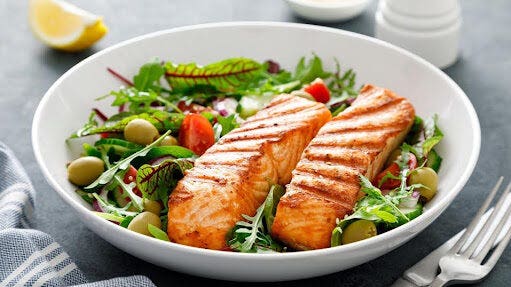
Individuals with hypothyroidism should incorporate the following foods into their diet:
Iodine
“Iodine is an essential mineral in the production of thyroid hormones,” says Dr. Eitches. While severe iodine deficiency can lead to hypothyroidism, excess iodine can be equally as problematic for the thyroid (potentially leading to hyperthyroidism), which is why Papapos emphasizes that it’s essential to get just enough.
Work with a health care provider to determine an iodine intake that’s appropriate for you. Food sources of iodine include:
- Fish like cod and tuna
- Shellfish
- Seaweed
- Milk
- Yogurt
- Cheese
- Eggs
- Iodized salt
Selenium
Selenium supports the thyroid in two ways, says Dr. Eitches. “It decreases antibody activity in individuals with Hashimoto’s and supports the conversion of T4 to T3,” she says. T3 is the active form of thyroid hormone that helps regulate metabolism and other functions in the body’s cells and tissues. The conversion of T4 to T3 helps ensure the proper balance of thyroid hormones in the body. Selenium-rich food sources include:
- Seafood
- Meat
- Poultry
- Eggs
- Milk
- Yogurt
- Cheese
- Whole grains
Zinc
Like selenium, zinc is essential for activating thyroid hormones, says Dr. Eitches. “Zinc deficiency has been shown to cause hypothyroidism and decreased metabolism,” she adds. Good food sources of zinc include:
- Oysters and other shellfish
- Meat
- Fish
- Poultry
- Fortified breakfast cereal
- Beans
- Nuts
- Whole grains
- Eggs
- Dairy products
Magnesium
Magnesium is important in the balance and production of thyroid hormones, says Papanos. She adds that very low magnesium levels are associated with abnormal thyroid function, potentially increasing the risk of hypothyroidism. Foods high in magnesium include:
- Legumes
- Nuts
- Seeds
- Whole grains
- Green leafy vegetables
- Milk
- Yogurt
- Cheese
- Fortified breakfast cereals
Iron
Just as iron is essential for thyroid hormone metabolism, iron deficiency can impair the process, says Dr. Eitches. You can get iron by eating the following foods:
- Lean meat, poultry or seafood
- Fortified breads and breakfast cereals
- Beans
- Peas
- Spinach
- Nuts
- Dried fruits, such as raisins
Vitamin D3
Vitamin D3 is obtained through food and made in the body after sun exposure, says Papanos. Research indicates that low levels of the nutrient are linked with autoimmune hypothyroidism.
The following foods can help you get more vitamin D:
- Fatty fish, like salmon, tuna and mackerel
- Fish liver oil
- Beef liver
- Egg yolks
- Cheese
- Fortified breakfast cereals and orange juice
Vitamin B12
People who have hypothyroidism are more likely to be deficient in vitamin B12, a nutrient that’s important for blood and nerve health and energy production, says Dr. Eitches. Dietary sources of vitamin B12 include:
- Seafood, especially oysters and clams
- Poultry
- Meat
- Organ meats like beef liver
- Eggs
- Milk
- Cheese
- Yogurt
- Fortified breakfast cereals
